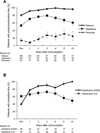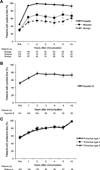Longitudinal analysis of antibody response to immunization in paediatric survivors after allogeneic haematopoietic stem cell transplantation
- PMID: 22017512
- PMCID: PMC3237834
- DOI: 10.1111/j.1365-2141.2011.08913.x
Longitudinal analysis of antibody response to immunization in paediatric survivors after allogeneic haematopoietic stem cell transplantation
Abstract
The long-term antibody responses to re-immunization in recipients of allogeneic haematopoietic stem cell transplantation (allo-HSCT) have not been well studied. We prospectively and longitudinally evaluated the antibody responses to eight vaccine antigens (diphtheria, tetanus, pertussis, measles, mumps, rubella, hepatitis B, and poliovirus) and assessed the factors associated with negative titres in 210 allo-HSCT recipients at St. Jude Children's Research Hospital. Antibody responses lasting for more than 5 years after immunization were observed in most patients for tetanus (95.7%), rubella (92.3%), poliovirus (97.9%), and, in diphtheria-tetanus-acellular pertussis (DTaP) recipients, diphtheria (100%). However, responses to pertussis (25.0%), measles (66.7%), mumps (61.5%), hepatitis B (72.9%), and diphtheria in tetanus-diphtheria (Td) recipients (48.6%) were less favourable, with either only transient antibody responses or persistently negative titres. Factors associated with vaccine failure were older age at immunization; lower CD3, CD4 or CD19 counts; higher IgM concentrations; positive recipient cytomegalovirus serology; negative titres before immunization; acute or chronic graft-versus-host disease; and radiation during preconditioning. These response patterns and clinical factors can be used to formulate re-immunization and monitoring strategies. Patients at risk for vaccine failure should have long-term follow-up; those with loss of antibody response or no seroconversion should receive booster immunizations.
© 2011 Blackwell Publishing Ltd.
Conflict of interest statement
The authors have no potential conflicts of interest, including specific financial interests, relationships, or affiliations relevant to the subject of this manuscript.
Figures



References
-
- Ada G. Advances in immunology - Vaccines and vaccination. New England Journal of Medicine. 2001;345:1042–1053. - PubMed
-
- Amanna IJ, Carlson NE, Slifka MK. Duration of humoral immunity to common viral and vaccine antigens. N Engl J Med. 2007;357:1903–1915. - PubMed
-
- Chen X, Hale GA, Barfield R, Benaim E, Leung WH, Knowles J, Horwitz EM, Woodard P, Kasow K, Yusuf U, Behm FG, Hayden RT, Shurtleff SA, Turner V, Srivastava DK, Handgretinger R. Rapid immune reconstitution after a reduced-intensity conditioning regimen and a CD3-depleted haploidentical stem cell graft for paediatric refractory haematological malignancies. Br J Haematol. 2006;135:524–532. - PubMed
-
- Clark DA, Emery VC, Griffiths PD. Cytomegalovirus, human herpesvirus-6, and human herpesvirus-7 in hematological patients. Seminars in Hematology. 2003;40:154–162. - PubMed
MeSH terms
Substances
Grants and funding
LinkOut - more resources
Full Text Sources
Research Materials

